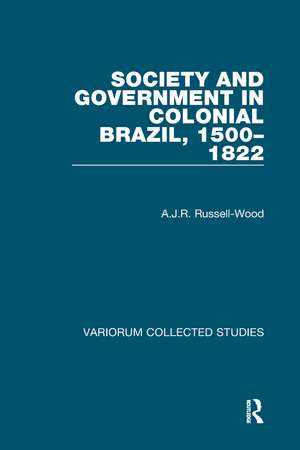Society and Government in Colonial Brazil, 1500–1822: Variorum Collected Studies
Autor A. J. R. Russell-Wooden Limba Engleză Hardback – 24 sep 1992
Din seria Variorum Collected Studies
- 9%
 Preț: 938.85 lei
Preț: 938.85 lei -
 Preț: 311.41 lei
Preț: 311.41 lei -
 Preț: 351.48 lei
Preț: 351.48 lei -
 Preț: 313.38 lei
Preț: 313.38 lei -
 Preț: 386.77 lei
Preț: 386.77 lei -
 Preț: 325.68 lei
Preț: 325.68 lei -
 Preț: 396.00 lei
Preț: 396.00 lei -
 Preț: 312.75 lei
Preț: 312.75 lei - 9%
 Preț: 1041.23 lei
Preț: 1041.23 lei -
 Preț: 258.66 lei
Preț: 258.66 lei -
 Preț: 299.55 lei
Preț: 299.55 lei - 9%
 Preț: 938.08 lei
Preț: 938.08 lei -
 Preț: 343.33 lei
Preț: 343.33 lei -
 Preț: 311.18 lei
Preț: 311.18 lei - 9%
 Preț: 937.13 lei
Preț: 937.13 lei -
 Preț: 351.41 lei
Preț: 351.41 lei -
 Preț: 320.00 lei
Preț: 320.00 lei - 34%
 Preț: 764.20 lei
Preț: 764.20 lei - 23%
 Preț: 315.48 lei
Preț: 315.48 lei - 36%
 Preț: 740.06 lei
Preț: 740.06 lei - 34%
 Preț: 764.20 lei
Preț: 764.20 lei - 34%
 Preț: 680.73 lei
Preț: 680.73 lei - 26%
 Preț: 247.40 lei
Preț: 247.40 lei - 34%
 Preț: 485.78 lei
Preț: 485.78 lei - 38%
 Preț: 766.91 lei
Preț: 766.91 lei - 34%
 Preț: 767.07 lei
Preț: 767.07 lei - 34%
 Preț: 764.20 lei
Preț: 764.20 lei - 34%
 Preț: 769.51 lei
Preț: 769.51 lei - 38%
 Preț: 769.85 lei
Preț: 769.85 lei - 34%
 Preț: 826.68 lei
Preț: 826.68 lei - 25%
 Preț: 225.28 lei
Preț: 225.28 lei - 25%
 Preț: 225.54 lei
Preț: 225.54 lei - 34%
 Preț: 736.38 lei
Preț: 736.38 lei - 34%
 Preț: 738.43 lei
Preț: 738.43 lei - 25%
 Preț: 226.52 lei
Preț: 226.52 lei - 33%
 Preț: 491.66 lei
Preț: 491.66 lei - 34%
 Preț: 485.78 lei
Preț: 485.78 lei - 34%
 Preț: 485.78 lei
Preț: 485.78 lei - 36%
 Preț: 739.17 lei
Preț: 739.17 lei - 38%
 Preț: 766.34 lei
Preț: 766.34 lei - 31%
 Preț: 473.94 lei
Preț: 473.94 lei - 18%
 Preț: 843.61 lei
Preț: 843.61 lei - 38%
 Preț: 774.91 lei
Preț: 774.91 lei - 38%
 Preț: 769.92 lei
Preț: 769.92 lei - 34%
 Preț: 764.20 lei
Preț: 764.20 lei - 51%
 Preț: 485.78 lei
Preț: 485.78 lei - 36%
 Preț: 488.49 lei
Preț: 488.49 lei - 34%
 Preț: 769.10 lei
Preț: 769.10 lei - 38%
 Preț: 766.99 lei
Preț: 766.99 lei - 18%
 Preț: 1019.01 lei
Preț: 1019.01 lei
Preț: 492.20 lei
Preț vechi: 734.36 lei
-33% Nou
Puncte Express: 738
Preț estimativ în valută:
94.18€ • 98.33$ • 77.95£
94.18€ • 98.33$ • 77.95£
Carte tipărită la comandă
Livrare economică 04-18 aprilie
Preluare comenzi: 021 569.72.76
Specificații
ISBN-13: 9780860783336
ISBN-10: 0860783332
Pagini: 352
Dimensiuni: 152 x 229 x 25 mm
Greutate: 0.81 kg
Ediția:1
Editura: Taylor & Francis
Colecția Routledge
Seria Variorum Collected Studies
Locul publicării:Oxford, United Kingdom
ISBN-10: 0860783332
Pagini: 352
Dimensiuni: 152 x 229 x 25 mm
Greutate: 0.81 kg
Ediția:1
Editura: Taylor & Francis
Colecția Routledge
Seria Variorum Collected Studies
Locul publicării:Oxford, United Kingdom
Public țintă
Academic and PostgraduateCuprins
Contents: Preface; Ports of colonial Brazil; Frontiers in colonial Brazil: reality, myth and metaphor; Local government in Portuguese America: a study in cultural divergence; Class, creed and colour in colonial Brazil: a study in prejudice; Prestige, power and piety in colonial Brazil: the Third Orders of Salvador; Examination of selected statutes of three African brotherhoods; Women and society in colonial Brazil; António Alvares Pereira: a Brazilian student at the University of Coimbra in the 18th century; Manuel Nunes Viana: paragon or parasite of Empire?; A cause célèbre of colonial Brazil: António Fernandes’ personal struggle for justice; United States scholarly contributions to the historiography of colonial Brazil; Index.
Descriere
Professor Russell-Wood’s detailed studies of Brazilian social history in the colonial era have long been recognised as model contributions to the history of class, race, gender and religion. This collection combines work on particular persons and groupings with survey articles on the role of the port and the frontier in colonial Brazil and on its historiography. The author describes the administration and structure of government, and the realities of royal power, with examples drawn from the port cities and the mining townships of the interior, then moves on to examine the interplay of class, religion and race with reference to brotherhoods of persons of African descent and the racially exclusive Third Orders. One group who overcame legal, physical and social constraints were women who, whether of European or African descent, contributed decisively to the economy and society of Brazil. To conclude, there are accounts of three individuals, each of whose experiences illustrate facets of the judicial system, governance and education in Portugal’s richest colony.











